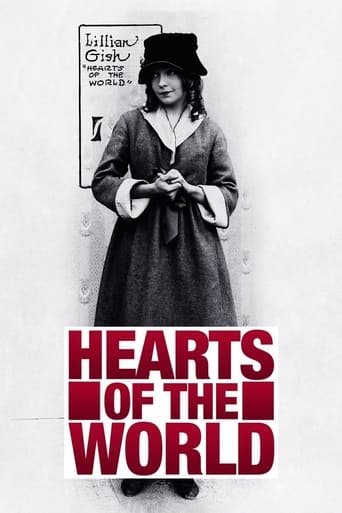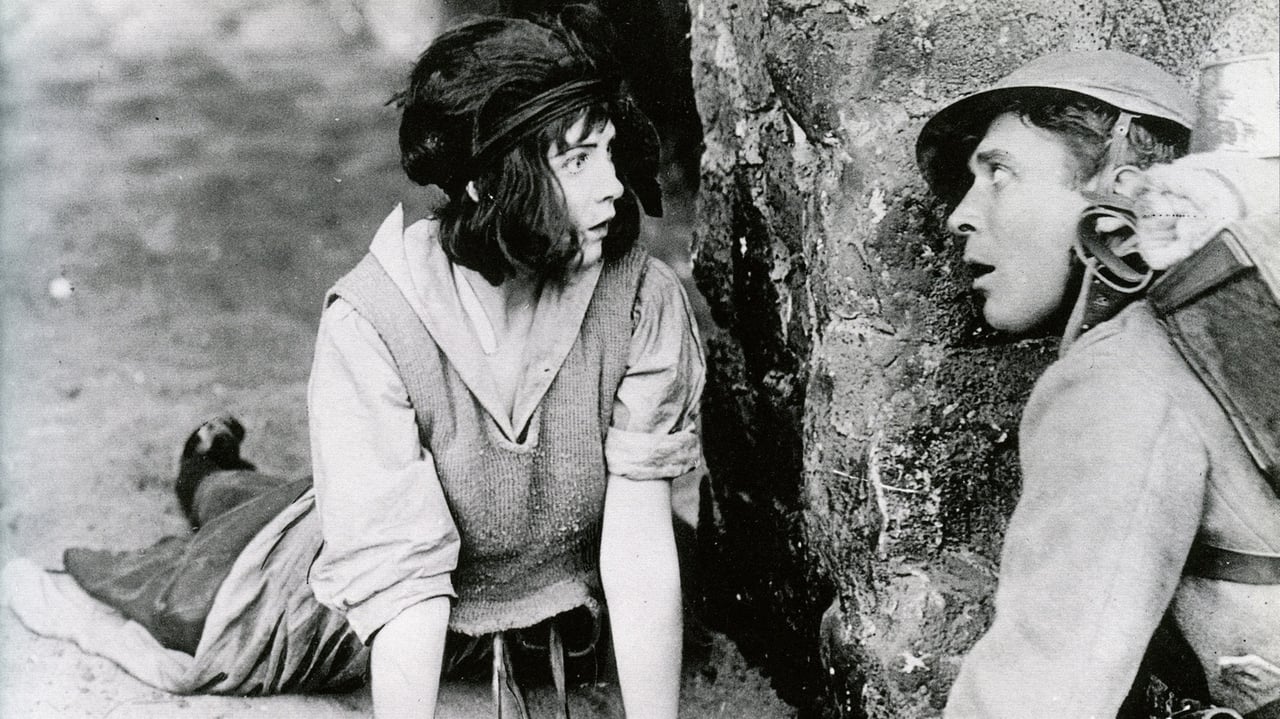Michael Morrison
Lillian Gish is one major reason I want a time travel machine.She was one of the loveliest women ever photographed; and she was a marvelous actress."Hearts of the World" is a major production, with some astonishing, especially for 1918, technical achievements.Other reviewers have mentioned Billy Bitzer's photography, and every mention that can be made should be made: Magnificent!Griffith's direction, overall, is also magnificent, but there are times the camera angle changes result in choppiness; perhaps, though, that is an editing fault more than one of directing.Acting overall is superb; the story is heart-rending; the anti-war feeling engendered is urgent.Ironically, supposedly the movie was made at the behest of the Brits, trying to propagandize these United States into joining the war. Yet Griffith still managed to portray the horrors of war, with a not exactly subliminal message against those horrors.Lillian Gish said, "I don't believe that Mr. Griffith ever forgave himself for making 'Hearts of the World.' 'War is the villain,' he repeated, 'not any particular people.'""War's gift to the common people," reads one intertitle, as the people of the French village are told to evacuate.The Girl, who was supposed to be marrying The Boy on this day, hurries to try to save her wedding ensemble."In the little room where she had dreamed so many dreams, she puts her sweetest one away," says the intertitle, while she tries to hide away her wedding gown. She is one of those "common people" who are allowed to exist only as cogs in the great machinery of the state, for the state, not for their own purposes.Human lives matter not at all, not even lives of the civilians not, supposedly, actively engaged in the conflict.All that matters is the state, the government, and such ephemera as national pride. More solid, but still meaningless, entities as national boundaries count for more than mere human beings.D.W. Griffith was the son of a war hero, Roaring Jake Griffith, who, after being wounded, still led a charge against the invading Yankees -- driving a wagon!Yet David Wark Griffith opposed war's horrors and demonstrated that opposition in several movies, including "Birth of a Nation" and "Intolerance."In some ways, "Hearts of the World" is his biggest achievement even though it is little known today.There are some few versions at YouTube.com, but the first one on the list has no music, the second has a score that is sometimes inappropriate. But both are pretty good prints. "Hearts of the World" is a must see, for its own self, and for your own self as a movie historian or as a movie scholar or as a movie fan.
FerdinandVonGalitzien
The relationship between this Herr Graf and Herr D. W. Griffith has been always complicated, even tumultuous through the years due to artistic considerations and differences. These disputes don't of course lessen the Amerikan director's fundamental importance in cinema history for this German count. The basic problem with Herr Griffith is that he is sometimes simplistic in his stories and often paternalistic combining religion and conservative values that make some of his work seem very dated. "Hearts Of The World" has many of those irreconcilable artistic differences for this German count. The film depicts the loves and sorrows of two American citizens in France ( Why do they have to be Americans? Surely there were lovers in France) and their families in a little town during WWI.During the first part of the film, Herr Griffith depicts the idealized and tranquil lives of the two sweethearts, their families and their neighbours, all in the typical and sentimental Herr Griffith style. There is so much sweetness in the air that this Herr Graf found himself looking forward anxiously to the arrival of Germans. Arrive they finally do, invading the village and poisoning the idyllic life with their brutality and bad manners."Hearts Of The World" it is not a pacifist film; it is true that in 1918, the date of the film's release, the world was still licking its wounds after such a big disaster but the end of the war was in sight and new perspectives were emerging making the film's lopsided and patriotic approach seem out of date. Obviously "Heart Of The World" is a fictional film not a documentary ( although the film includes real war sequences besides a prologue for the British release in which Herr Griffith himself appears in the war trenches and at 10 Downing Street; a good example of Griffith's sense of self importance ) nor does it need to be one but the story lacks interesting and realistic characters.As this Herr Graf mentioned before, the typical Herr Griffith mannerisms don't reduce his artistic accomplishments and there is much narrative vigor in this film, especially during the war sequences. It has a number of strong scenes, including one wherein our hero is paying a visit to his sweetie ( well, he's on some sort of secret mission while his comrades are being killed trying to retake the village). There is also a beautiful sequence showing our suffering heroine, temporarily deranged, and wandering in the field camp looking for her fiancée. Also outstanding are the decors and the skillful combination of fictional and real war sequences; splendid editing gives motion and emotion to those scenes.The actors do their best within the limits of Herr Griffith's particular artistic interests; Herr Douglas Gordon Hamilton does well as the handsome hero, a promising bourgeoisie writer before the war. Frau Lillian Gish and her curls, is the typical Herr Griffith heroine, conservative and candid. She will lose her innocence during wartime but emerge the stronger for it. Meanwhile Frau Lillian Gish's sister, Frau Dorothy, playing the Little Disturber overacts painfully while the German actors play their characters as America saw Germans, brutal and ruthless, utterly indifferent to the pain of others."Hearts Of The World" is a Herr Griffith film that devotees of the Amerikan film director will enjoy a lot and those who have many differences with the Griffith style, will still appreciate it to some extent if they put aside the Amerikan director's conventional and dated approach to the story and characters.And now, if you'll allow me, I must temporarily take my leave because this German Count must attend a soirée full of heartless Teutonic aristocrats.Herr Graf Ferdinand Von Galitzien http://ferdinandvongalitzien.blogspot.com
Michael_Elliott
Hearts of the World (1917) *** (out of 4) D.W. Griffith's WW1 epic has two Americans (Robert Harron, Lillian Gish) living in France and falling in love. When the German's attack the man goes off to fight, which ends with devastating results. The actual making of this film is somewhat more interesting than the final product, although the movie is still good but several notches below The Birth of a Nation and Intolerance. After that epic 1916 film Griffith wanted to try something bigger and found that the British government was willing to give him full access to anything he wanted. Griffith wanted to shoot real battle scenes and that's what he did for the film and he nearly once again was killed doing so. The British paid for the film to be made in hopes that it would inspire America to join the war effert. As for the film, it has some brilliant moments but sadly the love story really brings things down, which was somewhat surprising since Griffith is usually good with the melodrama. Harron is decent in his role but not strong enough to carry the film. Gish on the other hands is terrific as usual as is her sister Dorothy. Erich von Stroheim plays one of the German's in charge. The battle scenes, a lot of them real WW1 footage, is the highlight of the film and like Griffith's previous two films, it's rather amazing to see everything play out. This is certainly some of the greatest battlefield scenes I've ever watched. There's also another terrific scene where Gish, fearing her love is dead, tries to find him in the trenches. Gish's walk mixed with the beautiful cinematography makes this an unforgettable scene. In the end the film is certainly flawed but the battle scenes make it worth at least one viewing.
Cineanalyst
The Great War's impact on cinema worldwide was enormous and opened the door to America's global dominance in the business as other countries were devastated by battle. Additionally, it created some interesting American films among a newly popularized genre of war pictures, including "Civilization" (1916), "Joan the Woman" (1917), "Shoulder Arms", "The Sinking of the Lusitania", "The Heart of Humanity" and this one, "Hearts of the World" (the latter four from 1918). And continuing into the silent era of the 1920s, with some distance from the war, such films as "The Four Horseman of the Apocalypse", "The Love Light" (both 1921), "The Big Parade" (1925), "Mare Nostrum", "What Price Glory" (both 1926), "Seventh Heaven" and "Wings" (both 1927) were made.D.W. Griffith was generally a pacifist; that's clear in many of his films, despite their exciting battle sequences. Not unexpectedly, however, with "Hearts of the World", he gave his support to the entente cause and with the aid of the British government called for the US entry into the war. That had already occurred by the time of completion of the film, though, and so the ending has the US army saving the day. Yet, the picture still contains a pacifist plea, or regret over the situation.The excellent war scenes, which incorporate actual footage from the front, add power and realism to the sympathetic message. Cinematographer G.W. Bitzer (or others under his influence, as he was absent from location shooting in France due to his German heritage) uses small-scale widescreen masking effects during the battle scenes, as he had in "Intolerance". It's effective, as the scenes are generally shown from a distance, more so, and surely for practical reasons, than in other Griffith films. As a result, it seemed more real to me (and much of it was real).Generally, I welcome the drama of love between Robert Harron and Lillian Gish's characters threatened against the backdrop of war. Gish's episode with insanity is especially well realized, and Dorothy Gish is delightful as "The Little Disturber". But, the drama does subvert the power and realism of the film at times. It is indeed "an old fashioned play", and there are some ludicrous moments in it, such as a rehashed scene from "The Birth of a Nation" where Gish's virginity is threatened by a German officer.The following year, Abel Gance demonstrated how a fictional story could add to the power and realism in his anti-war opus "J'Accuse!" And, that's what separates these two films. In "J'Accuse!", there is rape by a German soldier and an analogous love triangle. Its approach is considerably more downbeat, however, and much more real, rather than the old-fashioned sentimentality, theatricality and naivety that occasionally creeps up in "Hearts of the World". Yet, that's to be expected in Griffith's work, and it doesn't detract severely from the better parts of the film, or the drama. Overall, "Hearts of the World" represents and reflects an important time in both film history and world history.


 AD
AD


